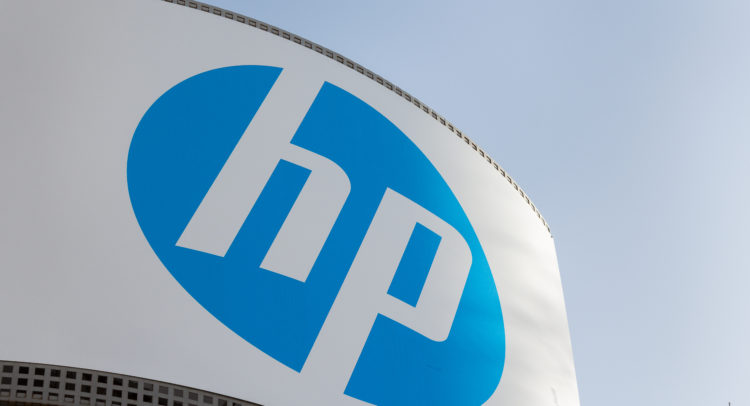Shares of HP (HPQ) stock have been trending higher of late as broader markets sag lower, thanks in part to Warren Buffett’s big vote of confidence in his sizeable stake.
Stay Ahead of the Market:
- Discover outperforming stocks and invest smarter with Top Smart Score Stocks
- Filter, analyze, and streamline your search for investment opportunities using Tipranks' Stock Screener
At just 6.7 times trailing earnings, HPQ stock is undeniably cheap. Even in the face of a potential recession, HP stock looks priced with not much in mind for the next 18 months.
Though the stock has slipped in recent trading sessions, it is down just 2% year to date, outdoing the broader S&P 500, which finds itself down around 13% year to date.
Indeed, you can find comfort in Warren Buffett’s ownership and the stock’s rock-bottom multiple. However, does the company have anything truly going for it in the choppy market environment that could see consumer sentiment begin to take a slip?
While HP may not be nearly as exciting as it used to be, it’s still a leader in the computer peripherals market, which could experience a long-term boost from the ongoing digital transformation.
The company’s recent $3.3 billion acquisition of Poly is an intriguing deal that bolsters HP’s video and audio equipment positioning. Given that remote work is here to stay, such a deal shines a light on where the firm may be headed next, as it looks to create value for shareholders. I am bullish on HPQ.
HP’s Poly Bet Makes the Company Even More Relevant
Though video conferencing may have taken many steps back since the economy mostly returned from pandemic-era lockdowns, the Poly deal looks well-timed, given such products are very necessary for the long-term rise of remote and hybrid work.
The initial reaction to HP’s Poly deal was met with skepticism.
Shares of HP initially slipped modestly in late March when it probably should have rallied. Arguably, HP deserves a round of applause for stepping up to the acquisition plate at a time like this, when there may be actual value to be had in the tech scene.
Undoubtedly, Warren Buffett is a big fan of being greedy while others are fearful. HP took a page out of the Oracle of Omaha’s book with its recent Poly deal, in my opinion.
While the Poly deal will not pay off overnight, it makes HP, an old firm that may have lost its way amid the rise of “sexier” tech companies, increasingly relevant in the age of digital work.
Even for those for opt to go into the office when the pandemic ends, video conferencing peripherals are a must to collaborate with employees that may never step foot into an office as per their contracts.
Though there are rivals in the somewhat-commoditized collaboration peripherals space, there’s no denying Poly’s dominant positioning in the often-overlooked market.
Still, $3.3 billion is not a cheap deal for a $38.5 billion company. Though investors may think HP could have gotten a better deal had it waited, I do think there’s a good chance that the deal will prove its worth in time. Simply put, I like firms that are making moves at a time like this.
The work-from-anywhere trend is likely here to stay. Unfortunately, so too is the pandemic, even if Americans are experiencing the closest thing to normal that we’ve had since the pandemic began just over two years ago.
Does Warren Buffett’s HP Bet Rhyme with His IBM or Apple Investment?
Warren Buffet’s bet on HP is a classic, boring value bet. It is by no means an exciting bet, but I do think the Oracle of Omaha is right on the money by taking on such a sizeable 11% stake at these depressed multiples.
Though HP has its shortcomings (the printing business looks brutal these days), the dirt-cheap valuation on the stock makes it really hard to ignore, even with the Buffett premium now slapped on.
The real question on the minds of investors is whether Warren Buffett’s HP investment will have the fate of the soured IBM (IBM) investment or the glorious bite out of Apple (AAPL).
IBM was a losing investment that Buffett eventually ditched, while Apple grew to be a very influential part of the man’s portfolio.
Like HP, IBM was seen as a great value play when Buffett bought shares. Arguably, there was a lot of innovation going on behind the scenes at IBM, with the likes of quantum-computing projects and AI project Watson.
Still, IBM proved to be a value trap when Buffett punched his ticket. Ultimately, IBM lost its way as rivals in the fast-moving tech scene moved in. Watson is an incredible innovation. There’s no question about that. The only problem is it wasn’t a cash cow for IBM. If anything, it costs the firm a considerable amount in R&D.
On the other hand, Apple is one of the most exciting companies on the planet. It’s the world’s largest firm, and it continues to shock and awe its customers with intriguing, must-have hardware offerings.
Apple is hardly a growth stock, with high single-digit and low double-digit revenue growth prospects. Still, it is a massive cash cow.
Today, Apple is swimming with cash, and that’s a major reason why shares have been (mostly) spared from the market sell-off, though this could change following Tim Cook’s downbeat guide over ongoing global supply challenges.
Finally, there’s a strong case for why Apple is, in fact, a growth stock. Sure, growth has slowed in recent quarters, but look up ahead, and there’s a lot to get excited about on the earnings growth front. Apple has many wildcards up its sleeves that other tech firms lack.
Apple’s a secretive company. It has VR and AR products that are likely brewing behind the scenes. With the Apple Car wildcard thrown in, Apple could easily accelerate its growth profile at the drop of a hat. So, don’t dismiss Apple as not a growth company because it’s proven its doubters wrong for so long. Not only are such innovations intriguing, but they also have considerable sales and earnings growth potential.
Where does HP fit in these two molds? I’d argue that HP fits into the Apple mold. Why?
The company is a cash cow, and it’s a cash cow that could become bigger.
Further, HP is returning capital back to shareholders in a big way in the form of share repurchases and dividend hikes. As you know, Buffett is a big fan of buybacks with Apple. He doesn’t have to do anything, and his stake in the company will increase.
With Buffett’s HP ownership standing at around 121 million HP shares, it’s clear that Buffett sees deep value in a firm whose cash flow prospects could improve and pave the way for more capital returned into the wallets of shareholders.
Wall Street’s Take
Turning to Wall Street, HPQ stock comes in as a Hold. Out of eight analyst ratings, there is one Buy, five Holds, and two Sell recommendations.
The average HPQ price target is $36.36, implying downside potential of 1.9%. Analyst price targets range from a low of $29.00 per share to a high of $43.00 per share.

The Bottom Line on HP Stock
In short, HP is a boring value firm that’s getting a bit more exciting following the recent acquisition of Poly. Despite the boring nature of HP, the company is a cash cow at a low multiple and a potential stealth way to play the ongoing digital transformation.
HP seems to “rhyme” with Apple, given its cash flows and capital return program. Add the cheap multiple into the equation, and I view HP as real value, not some sort of trap.
My takeaway? Warren Buffett has spotted a glimmer of value amid the wreckage, and he’s not holding back with such aggressive buying activity.
Discover new investment ideas with data you can trust.
Read full Disclaimer & Disclosure
















